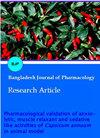Salvia officinalis induces antidepressant-like effect, anxiolytic activity and learning improvement in hippocampal lesioned and intact adult rats.
IF 0.9
4区 医学
Q4 PHARMACOLOGY & PHARMACY
引用次数: 7
Abstract
The anxiolytic and antidepressant like effects of Salvia officinalis extract (50, 100 and 200 mg/kg) were evaluated using marble burying, forced swimming and open-field tests in intact and hippocampal lesioned rats. Additionally, S. officinalis was evaluated on rat's memory using conditioned learning test. and we screened the methanolic extract for anti-oxidant activity, phytochemical and high performance liquid chromatography analyses. The administration of sage extract showed a significant reduction of immobility time in lesioned and intact animals during the forced swim test and anxiolytic effect in marble burying test. In the case of conditioned learning paradigm, memory enhancement was observed in sage treated group which indicates a cognition improvement. These activities seem to be related to the anti-oxidant capacity and the phytochemicals (phenolic, flavonoid, and tannin) detected into the extract of S. officinalis. The findings show that the methanolic extract of sage possess antidepressant-like effect, anxiolytic activity and also may contain bioactive compounds that stimulate learning in rat.丹参对海马损伤大鼠和完整大鼠具有抗抑郁样作用、抗焦虑活性和学习改善作用。
采用大理石掩埋法、强迫游泳法和野外实验对完整大鼠和海马损伤大鼠进行了丹参提取物(50、100和200 mg/kg)的抗焦虑和抗抑郁作用评价。另外,采用条件学习测试法对大鼠的记忆能力进行评价。并对甲醇提取物进行抗氧化活性筛选、植物化学分析和高效液相色谱分析。鼠尾草提取物在强迫游泳试验中显著减少了损伤和完好动物的静止时间,并在大理石掩埋试验中表现出抗焦虑作用。在条件学习范式下,鼠尾草治疗组的记忆增强,表明认知改善。这些活性可能与山茱萸提取物的抗氧化能力和植物化学物质(酚类、黄酮类和单宁)有关。结果表明,鼠尾草甲醇提取物具有抗抑郁、抗焦虑作用,并可能含有刺激大鼠学习的生物活性化合物。
本文章由计算机程序翻译,如有差异,请以英文原文为准。
求助全文
约1分钟内获得全文
求助全文
来源期刊

Bangladesh Journal of Pharmacology
PHARMACOLOGY & PHARMACY-
CiteScore
1.50
自引率
18.80%
发文量
4
审稿时长
>12 weeks
期刊介绍:
Bangladesh Journal of Pharmacology (Bangladesh J Pharmacol) is an open access, video component, peer-reviewed journal of the Bangladesh Pharmacological Society (BDPS).
A scholarly publication is defined ''open access'' when there are no financial, legal or technical barriers to accessing it. Anyone can read, download, copy, distribute, print or use it in educational purpose within the legal agreements.
Peer review of a manuscript means the evaluation of research work by one or more people with similar competences. It can be open or blind. We do the single-blind peer review.
Our readers want to know the methodology used by the researchers which is very important to get the results. The video clip of one of the methodologies is prepared by the authors and submit it to publish.
 求助内容:
求助内容: 应助结果提醒方式:
应助结果提醒方式:


